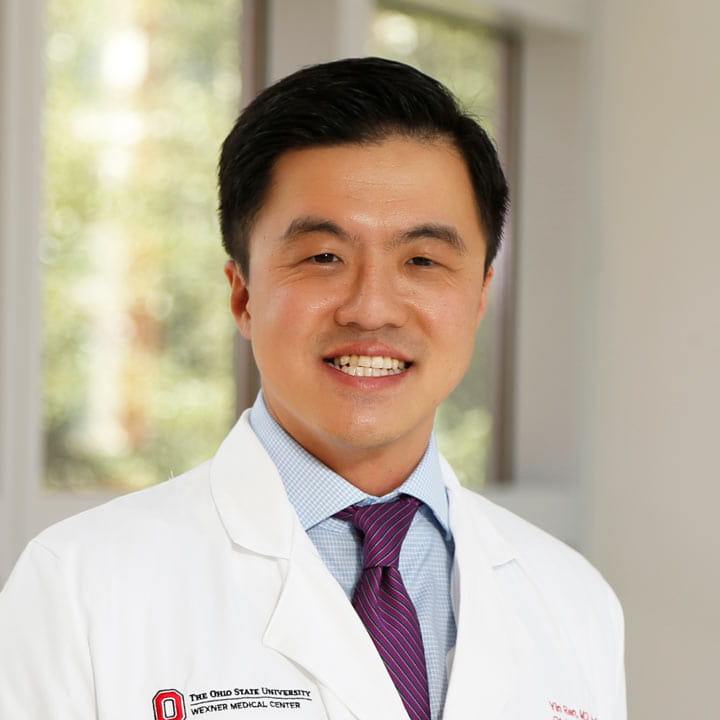 Career Development Awards from the National Institutes of Health (NIH) are highly coveted — and with good reason. In addition to providing financial support for a young researcher’s work, these “K Awards” are often a stepping stone to R01 funding. Fewer than half of K Award applicants are successful. Surgeon-scientist Yin Ren, MD, PhD, was selected on his first submission.
Career Development Awards from the National Institutes of Health (NIH) are highly coveted — and with good reason. In addition to providing financial support for a young researcher’s work, these “K Awards” are often a stepping stone to R01 funding. Fewer than half of K Award applicants are successful. Surgeon-scientist Yin Ren, MD, PhD, was selected on his first submission.
Dr. Ren, a neurotologist and assistant professor, joined the faculty of the Department of Otolaryngology – Head and Neck Surgery at The Ohio State University College of Medicine in 2021. In addition to caring for patients at The Ohio State University Wexner Medical Center, he’s a translational researcher with an interest in identifying and developing better biomarkers and targeted treatments for skull-base tumors such as vestibular schwannomas and neurofibromatosis 2. The K Award will support that work with $192,000 in grant money each year for the next five years.
Unlocking the unknown
“Neurotologists take primary responsibility for patients with vestibular schwannomas, but there is so much we still don’t understand about these conditions,” Dr. Ren says. “For example, why do some tumors grow quickly and others don’t? Why do only some patients lose their hearing? How can we better predict surgical outcomes? My lab is using a variety of biology and nanotechnology approaches to explore these questions, with the goals of characterizing tumor behavior and disease progression and developing nanoparticles to aid in the diagnosis and treatment of these diseases.”
Dr. Ren has long been interested in using nanotechnology to deliver diagnostic molecules and drugs that target specific cells or tissues. This interest stems from his dual training in medicine and engineering. He holds a medical degree from the Harvard Medical School-Massachusetts Institute of Technology (MIT) Joint Health Sciences and Technology Program and a PhD in medical engineering and medical physics from MIT. Dr. Ren completed a one-year internship in general surgery at Massachusetts General Hospital and his otolaryngology – head and neck surgery residency at the Harvard Combined Otolaryngology Program at Massachusetts Eye and Ear. He joined Ohio State’s faculty soon after completing a clinical fellowship in otology, neurotology and skull-base surgery at the University of California, San Diego.
A three-phase study
Dr. Ren’s NIH-supported study comprises three phases and is already underway. Phase I will identify tumor-classifying biomarkers that help predict disease progression. Dr. Ren’s team will use transcriptomic and proteomic profiling to identify molecules that are dysregulated in vestibular schwannoma in mice and humans. Of particular interest are proteases, which play a significant role in the growth of many other tumor types.
In phase II, Dr. Ren’s team will develop a library of nanomaterials that rapidly quantify vestibular schwannoma protease activity within a cell and establish an activity-based tumor-classifying biomarker.
In phase III, the team will develop protease-sensing, tumor-targeted nanoparticles. These could be delivered via injection to enhance the accuracy of surgical resection, ultimately reducing treatment-associated morbidity, preserving cranial nerve function and improving patient outcomes.
Although just in his second year as a faculty member, Dr. Ren is earning a reputation for innovation and creative problem-solving at the Ohio State Wexner Medical Center and beyond.
“Yin received a K Award about as quickly as a researcher possibly can, which is a testament to his skill and exceptional training,” says James Rocco, MD, PhD, chair of the Department of Otolaryngology – Head and Neck Surgery. “He has the methodical, critical thinking skills of an engineer and the determination of a physician to translate his lab research to the clinical setting so that it can benefit patients.”

2024 Year in Review
See how Ohio State is shaping the field of Otolaryngology – Head and Neck Surgery.
